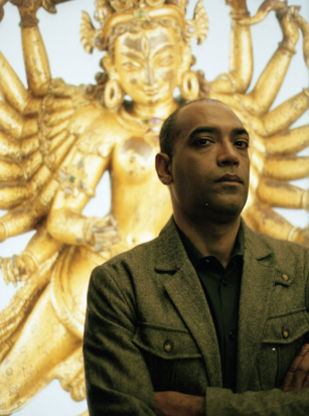Are You Going to Write That in Your Book?

One afternoon a few years ago, while on my way back from interviewing some factory workers, I was asked by a very neatly dressed young man if I had read the economist Amartya Sen’s work on famine. He’d first wanted to know if I could get him a job, then if I could help him immigrate to the United States, but when he realized that neither was a possibility, he began a discussion of Sen’s work. Democracies don’t have famines, Sen has written, whereas authoritarian regimes do; hence the four million who died in Bengal in 1943 under colonial rule. But my interlocutor was not interested in the apparent triumph of democracy in India since then. Instead, he seemed to think that the availability of food was a contemporary, pressing subject. “You remember what he said about famine, that it doesn’t necessarily happen because there isn’t enough food but because the powerful take food away from the powerless? Are you going to write that in your book?”
Why did the man, whose name was Amit Mishra, want to have this conversation when he discovered that I was working on a book? For the past twenty years, the narrative about India, around the world but especially among the Indian elites, has been of a rising economic superpower, of an ancient civilization that, after a long period of Gandhian fasting, has joined the ongoing party of globalization. After all, Mishra and I were standing in the shadow of a new highway that connected Bangalore and Hyderabad, two of the most prosperous urban economies in the country whose wealth is centered around the information technology and back office support services that seem to have become as integral an aspect of the Indian image in the 21st century as its 60-plus billionaires and its energetic, materialistic, English-speaking middle class. Why, in this interconnected, networked, globalized India, was it necessary to talk about the distribution of food and its relation to the distribution of power?
The usual response among elites in India and their boosters in the west is that such talk is the work of those holding themselves back deliberately from the flat world of globalization, a ragtag, jagged opposition that consists of leftists and environmentalists, feminists and Islamists, people whose one common feature is that they are all against development and modernization, against the Indian nation-state and its benevolent big brother, the United States. Still, what was Mishra thinking of? Was he aware that, after twenty years of glittering growth in India, forty-six per cent of children under the age of five suffer from malnutrition, that more than half of the population defecates in the open, and that while income inequality has doubled in twenty years, the government considers anyone who eats more than one banana every six days to be above the poverty line?
Mishra could, of course, have easily chosen to talk about how good things were. He was privileged in that he was male, Hindi-speaking, an upper-caste Hindu, and possessed a degree in accountancy; he was certainly far more privileged than the factory workers I had been spending time with or the waitress from a minority ethnic group whom I had been interviewing in Delhi before I came down south. There was no apparent reason, on the surface, for him not to have the same narrow sense of techno-determinism and Hindu majoritarianism possessed by most of the engineers I had interviewed in Bangalore. Yet, for reasons of his own, walking to factories miles apart from each other in the 90 degree heat to drop off his resumé, here he was, composed, well-mannered, and earnest, reminding me that writing had a social function, a responsibility to the world it drew its materials from.
It was very much an idea of writing I grew up with in India in the eighties. From the Progressive Writers’ Association, formed in 1934 at a London establishment with a Chinese name (“Hotel Nanking”) by a group of South Asians writing in languages as varied as Bengali, Urdu, and English, and whose manifesto located writing at the heart of social change, to the radical poets of the seventies celebrating the peasant uprising of Naxalbari, writers seem to have always known that there was too much of everything in the subcontinent for a pure, sterile aestheticism to be attractive. That engagement was what drew many of us into writing, although by the nineties, such engagement was already being threatened by neo-India, neoliberal in economics, neoconservative in politics, where it had become far too easy for the writer, especially the one writing in English, to become a house intellectual parroting back to the elites the things they wanted to hear, applauding their new wealth even if that wealth was being created through incredible, relentless violence, sometimes covert, as in the displacement of villages and people by dams and factories, and sometimes open, as in the military operations against disaffected populations in the north-east, central India, and Kashmir.
To write in such a context is invariably a social and political act. It is not a matter of giving voice to the voiceless, for the simple reason that the marginalized and the brutalized of the subcontinent are anything but unexpressive, uncreative, and voiceless. What they are, often, is silenced, their voices choked off with sticks and guns in the villages and forests and by technobabble and policy speak in the corridors of power. The voices that I have heard, in villages, small towns, and even in the cities, are varied, critical, creative, and generous. But what they say challenges the notions of growth and power embraced by the elites in India, that unctuous rhetoric gushing out from gathering places like Davos, shareholder meetings in London and New York, and the blustering panels convened on Indian television channels. These other voices, that of the multitude, express concerns about inequality and environmental degradation, about their suspicion that under the garb of democracy, India is dominated by a transnational oligarchy loyal only to its own material excess and its hold on power.
The writing that one does is therefore a matter of adding one’s voice to that of this multitude, of making a stand, of recording the ways in which millions come together to protest the nuclear reactors, dams, mines, power plants, highways, airports, factories, stadiums and shopping malls that are forced into the entrails of the subcontinent in a breakneck vision to remake India as a particular kind of modern society. It is really a matter of listening, of repeating and rephrasing the question asked by strangers in passing. It is to say: Am I going to write this in my book?
Cette ressource a été publiée dans le cadre de la cinquième saison du festival "Walls and Bridges", organisé par la Villa Gillet, qui s'est déroulé à New York du 9 au 18 octobre 2013.
Pour citer cette ressource :
Siddhartha Deb, Are You Going to Write That in Your Book?, La Clé des Langues [en ligne], Lyon, ENS de LYON/DGESCO (ISSN 2107-7029), décembre 2013. Consulté le 05/02/2026. URL: https://cle.ens-lyon.fr/anglais/litterature/entretiens-et-textes-inedits/are-you-going-to-write-that-in-your-book-



 Activer le mode zen
Activer le mode zen


